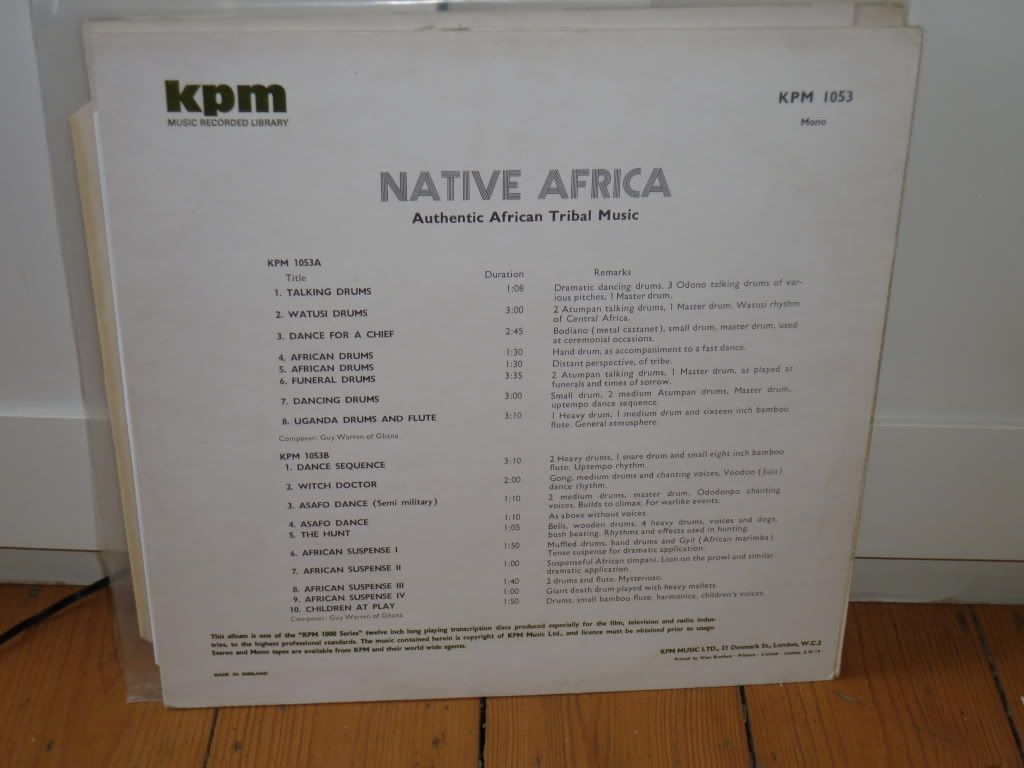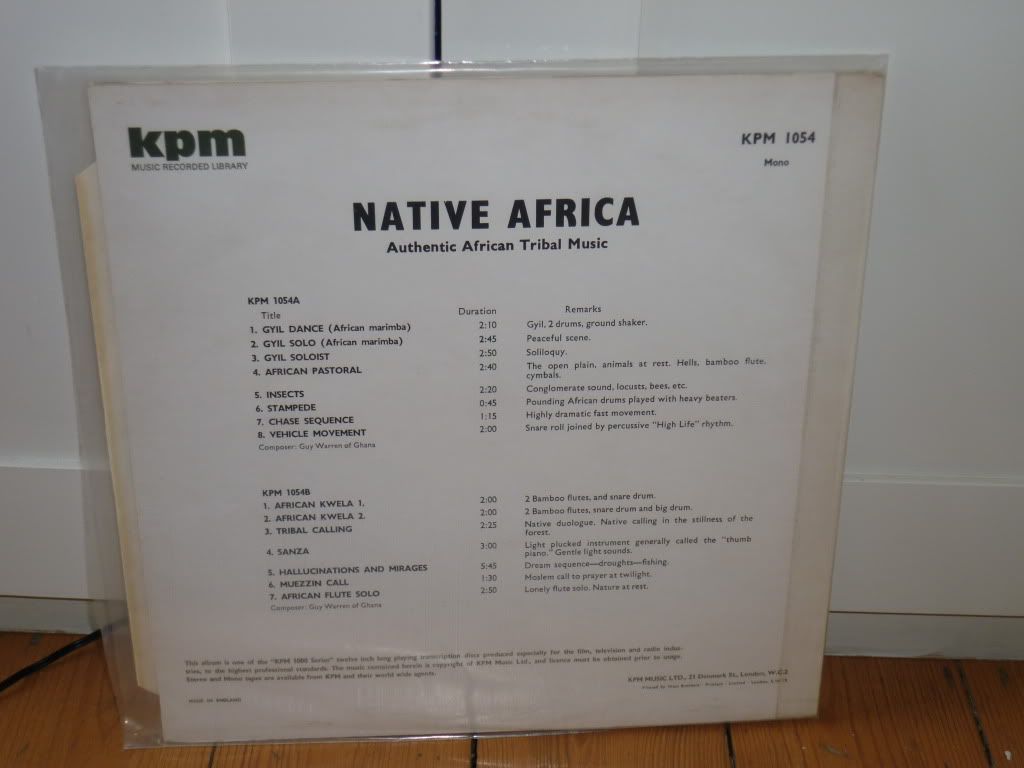Did I ever mention that I am obsessed with Guy Warren of Ghana?
Maybe at least once!
Anyway, here are a couple of records he did for KPM in 1968.
In 1968 he was in London (of course) and had just recorded Afro Jazz with Don Rendell, Ian Carr and Amancio D'Silva.
He would team up with D'Silva again for The African Soundz which you can read about here.
The money from KPM must have been good to persuade Guy to make these two records. Why else take time from your career to record two albums worth of material? The suspicion, before you've even put the needle on the record, is that he was going through the motions. A chance to earn some money and just exploit the situation.
But of course when you listen to the music and hear the quality of the songs, it is clear that this was not the case.
I must admit that when I first heard these records I was reminded of lots of very worthy 'in the field' recordings of African musicians. You know the stuff - field recordings of so-called 'ethnic' musicians, which come in worthy sleeves with lots of footnotes about the collator of the music, but little about the people who made it or how it fits into local culture.
By 1968 Guy Warren had moved beyond all of that easily categorizeable stuff.
Having played in London with Kenny Graham (another obsession of mine) and in the US with some of the legends of bebop, Warren was international. He had even been a DJ for the BBC World Service for God's sake!
Nevertheless these are his least jazz-influenced recordings. The usual KPM descriptions (click on the pictures to get a larger image) reference, Watusi (or as we say now Tutsi), Uganda, Asafo and Muslim music. They also talk about natives, lions, insects, tribes and witch doctors. I guess the best you can say is that it was 1968!
You can imagine the kind of programme that these tracks were intended to soundtrack. A white man, perhaps in khaki shorts and with a neat beard, drives a beaten up Land Rover across the veld. Perhaps he is accompanied by a faithful retainer, dressed in a mix of Western and local clothes. As they drive along, the camera pans back to show giraffe or elephants. You can hear drum-based music in the background to show that we really are in the deep heart of Africa!
Listening to these records make me wonder about Warren's relationship to Europe and America. Like many African artists he had left Africa to pursue his musical aspirations. How, did he have to compromise to achieve his aims? Did he relish the opportunity of recording these tracks for KPM or was is a distraction from his more jazz-related work? Did he find it easy to be a Ghanaian in London?
As with all things related to Guy Warren of Ghana it is best to let the music do the talking. I have taken my favourite tracks from each record. Apologies if you favourite isn't here.
01. Talking Drums - Dramatic dancing drums. 3 Odono talking drums of various pitches, 1 Master drum
02. Dancing Drums - Small drum, 2 medium Atumpan drums, Master drum, uptempo dance sequence
03. Uganda Drums and Flute - 1 Heavy drum, 1 medium drum and sixteen inch bamboo flute. General atmosphere
04. Witch Doctor - Gong, medium drums and chanting voices, Voodoo (Juju) dance rhythm
05. Asafo Dance (Semi Military) - 2 medium drums, master drum, Ododonpo chanting voices. Builds to climaz. For warlike events
06. African Suspense III - 2 drums and flute. Mysterioso
07. Children At Play - Drums, small bamboo flute, harmonica, children's voices
08. Gyil Dance (African marimba) - Gyil, 2 drums, ground shaker
09. Gyil Solo (African marimba) - Peaceful scene
10. African Pastoral - The open plain, animals at rest. Hells (sic), bamboo flute, cymbals
11. Vehicle Movement - Snare roll joined by precussice "High Life" rhythm
12. African Kwela I - 2 Bamboo flutes, and snare drum
13. Tribal Calling - Native duologue. Native calling in the stillness of the forest
14. Sanza - Light plucked instrument generally called the "thumb piano". Gentle light sounds
15. Hullcinations and Mirages - Dream sequence - droughts - fishing
16. African Flute Solo - Lonely flute solo. Nature at rest
Native Africa - click here
Maybe at least once!
Anyway, here are a couple of records he did for KPM in 1968.
In 1968 he was in London (of course) and had just recorded Afro Jazz with Don Rendell, Ian Carr and Amancio D'Silva.
He would team up with D'Silva again for The African Soundz which you can read about here.
The money from KPM must have been good to persuade Guy to make these two records. Why else take time from your career to record two albums worth of material? The suspicion, before you've even put the needle on the record, is that he was going through the motions. A chance to earn some money and just exploit the situation.
But of course when you listen to the music and hear the quality of the songs, it is clear that this was not the case.
I must admit that when I first heard these records I was reminded of lots of very worthy 'in the field' recordings of African musicians. You know the stuff - field recordings of so-called 'ethnic' musicians, which come in worthy sleeves with lots of footnotes about the collator of the music, but little about the people who made it or how it fits into local culture.
By 1968 Guy Warren had moved beyond all of that easily categorizeable stuff.
Having played in London with Kenny Graham (another obsession of mine) and in the US with some of the legends of bebop, Warren was international. He had even been a DJ for the BBC World Service for God's sake!
Nevertheless these are his least jazz-influenced recordings. The usual KPM descriptions (click on the pictures to get a larger image) reference, Watusi (or as we say now Tutsi), Uganda, Asafo and Muslim music. They also talk about natives, lions, insects, tribes and witch doctors. I guess the best you can say is that it was 1968!
You can imagine the kind of programme that these tracks were intended to soundtrack. A white man, perhaps in khaki shorts and with a neat beard, drives a beaten up Land Rover across the veld. Perhaps he is accompanied by a faithful retainer, dressed in a mix of Western and local clothes. As they drive along, the camera pans back to show giraffe or elephants. You can hear drum-based music in the background to show that we really are in the deep heart of Africa!
Listening to these records make me wonder about Warren's relationship to Europe and America. Like many African artists he had left Africa to pursue his musical aspirations. How, did he have to compromise to achieve his aims? Did he relish the opportunity of recording these tracks for KPM or was is a distraction from his more jazz-related work? Did he find it easy to be a Ghanaian in London?
As with all things related to Guy Warren of Ghana it is best to let the music do the talking. I have taken my favourite tracks from each record. Apologies if you favourite isn't here.
01. Talking Drums - Dramatic dancing drums. 3 Odono talking drums of various pitches, 1 Master drum
02. Dancing Drums - Small drum, 2 medium Atumpan drums, Master drum, uptempo dance sequence
03. Uganda Drums and Flute - 1 Heavy drum, 1 medium drum and sixteen inch bamboo flute. General atmosphere
04. Witch Doctor - Gong, medium drums and chanting voices, Voodoo (Juju) dance rhythm
05. Asafo Dance (Semi Military) - 2 medium drums, master drum, Ododonpo chanting voices. Builds to climaz. For warlike events
06. African Suspense III - 2 drums and flute. Mysterioso
07. Children At Play - Drums, small bamboo flute, harmonica, children's voices
08. Gyil Dance (African marimba) - Gyil, 2 drums, ground shaker
09. Gyil Solo (African marimba) - Peaceful scene
10. African Pastoral - The open plain, animals at rest. Hells (sic), bamboo flute, cymbals
11. Vehicle Movement - Snare roll joined by precussice "High Life" rhythm
12. African Kwela I - 2 Bamboo flutes, and snare drum
13. Tribal Calling - Native duologue. Native calling in the stillness of the forest
14. Sanza - Light plucked instrument generally called the "thumb piano". Gentle light sounds
15. Hullcinations and Mirages - Dream sequence - droughts - fishing
16. African Flute Solo - Lonely flute solo. Nature at rest
Native Africa - click here


I am looking to lay hands on Guy Warren's old stuff, before the transformation to Ghanaba. Any suggestions?
ReplyDeleteI'm afraid that there are no quick routes to tracking down all of Guy Warren's recordings
ReplyDeleteThe most easy to find are Themes For African Drums and African Rhythms. Africa Speaks, America Listens also appears reasonably regularly
After that it gets progessively more tricky until you get to Afro-Jazz which, when it does appear, is always expensive.
As far as I know none of his albums pre-Ghanaba are on CD
I;ve been trying to discover if he recorded with Kenny Graham's Afro-Cubists but I haven't unearthed anything to date
Not very helpful I realise!
Good luck
Where is the link? I am dying to hear these!
ReplyDelete